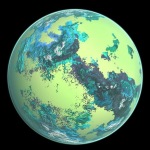 In her conversation with Jeff on Monday evening, Barbara Marx Hubbard described the arc of her journey as an evolutionary, beginning with an early encounter with the teachings of Teihard de Chardin, who first exposed her to the idea that evolution has a spiritual impulse and a direction toward higher order, greater complexity and more freedom.
In her conversation with Jeff on Monday evening, Barbara Marx Hubbard described the arc of her journey as an evolutionary, beginning with an early encounter with the teachings of Teihard de Chardin, who first exposed her to the idea that evolution has a spiritual impulse and a direction toward higher order, greater complexity and more freedom.
Not only does evolution have a distinct trajectory and purpose, but as we would point out in the the integral world, it’s happening in all four quadrants.
And it has become aware of itself. “We are the collective eyes of the noosphere,” she said, “Now we have a global brain that’s truly phenomenal, when you think of the amount of information that is coursing through that nervous system.”
Abraham Maslow, another one of Barbara’s early teachers, discovered that those who are joyful, beneficent and productive in the world all have one thing in common: a self-rewarding vocation. So she set out to realize the vision of a turquoise planet that she had so many years ago. “…evolution has direction, and it’s in every one of us, and I had become an expression of that.”
Also, what does it mean to be called an “American visionary”? Watch the video to hear Barbara’s answer, Jeff’s impressions, and some answers from the audience as well.
— Written by Brett Walker
Some of our favorite quotes of the evening from the great lady herself:
An evolutionary is a type. I’m pretty well convinced that some people have an innate sense of emergence and others do not. It’s like mathematics or athletic capability or, you know, genius for many different fields. It seems to me [there is a] genius for what’s emergent, an attraction for it, a sensitivity to cultivate it.
So the minute I got this impulse in me I felt depressed and disoriented [because] there was a desire for greater orientation toward Impulse. And just to make a very long story short, after reading Maslow, then I met Buckminster Fuller, and he said we have the resources, technology and know how to make the world work for everyone.
[hr]
If evolution is about moving to greater order, consciousness and freedom, where are we doing it? It’s such an obvious thing to start scanning for what’s working toward the goal of evolution, rather than for what isn’t working and how can you fix it. So most political life and most media is all about what doesn’t work, and if you’re about what does work something starts to happen.
Through my experience I became aware that the key was connectivity of that which is creative. The way I experienced the turquoise planet is the planet itself was connected by people who were breaking through everywhere. That was thirty, forty years ago. Now think of how many we are, breaking through everywhere, and yet the news is still [about] what isn’t working.
~ Barbara Marx Hubbard






I’ve always appreciated Barabara’s great spirit. More than anything she says, her *presence* is sweeping. Uplifting. I’m adding the video to my playlist this weekend, Jeff!
Balancing “what’s not working,” with what’s “creative/emergent” is a big challenge nowadays. I think, mainly because so much is at risk to fall apart. Hard to juggle both sometimes when we’re faced with a huge crisis and a socio-economic reality that is shattering at the foundation. Even in these dire times, though, I think we are seeing the rise of millions of innovative people, progressive people, who see the both sides of the coin. The crisis causes innovation. What doesn’t work stirs problem-solvers and system-builders to go off and develop alternative solutions. This is what excites me. And it remains murky.
For instance, I am in the middle of wrapping up my MA at Goddard and looking for adjunct positions in community colleges. The academic world is based on *doubt* and *critique.* In the humanities, “critical theory” and “cultural studies” are major worlds. As someone going out there now, into a fresh career, I’ve had to “travel between worlds,” of criticism and de-construction, and world-building. Tough to say the least. It requires the imagination, or as Hubbard says “what’s creative.” A huge amount of creative effort is needed now to surmount the challenges. I think Teilhard knew that. “Our task,” he wrote, “should we not perish, is to Build the Earth.” One of my favorite lines.
All the best, Jeff.
-Jeremy